Adventurous Kate contains affiliate links. If you make a purchase through these links, I will earn a commission at no extra cost to you. Thanks!
I’m happy to announce a new feature on Adventurous Kate — the Viewpoints column! This interview series will focus on independent female travelers around the world with interesting stories to tell.
As much as I want to represent all independent female travelers, as a white, straight, able-bodied, educated, middle-class American, I carry an enormous amount of privilege that affects my travels and my life. It’s a lot easier for me than it is for others, and I never forget that. For that reason, I’ve decided to explore privilege and travel in several upcoming posts.
First up is this interview with Maya Bhardwaj, whom I met in Ometepe, Nicaragua (and ran into subsequently in El Tunco, El Salvador, and San Pedro, Guatemala!). Maya is a community organizer in Detroit, a frequent expat, an avid hiker, and she has traveled extensively throughout the world.
As an Indian-American, she’s dealt with issues relating to race that white travelers never think about, and she was eager to discuss her experiences with Adventurous Kate readers. I’m very impressed by Maya, and I’m sure you’ll feel the same way after reading this interview.
Maya hiking volcanoes in El Salvador.
AK: What brought you to Central America this winter?
MB: It’s a delightfully garbled story. I had always had this idea in my head of backpacking alone through Central America (ideally with a motorcycle, a la Che, but I’m a pretty bad driver so that part was abandoned).
I speak Spanish, have previously lived in Argentina, and I wanted to continue to brush up my skills. And after I finished a job in late November working on the 2014 electoral cycle in the US, I had plans to travel to Jamaica with a friend. We spent a month there, and then he ended up taking a job in Costa Rica – and given that I had no other obligations, I tagged along!
After about a week in Costa Rica and a week spent interviewing in Rwanda for an organization there, my wanderlust kicked in full throttle and I decided I wanted to keep traveling. So I postponed the job hunt and went for it!
I pushed my flight back from February to March – and then to mid-April – and made my way from Costa Rica to Nicaragua, Honduras, El Salvador, Guatemala, and Belize.
Maya marching to protect social security benefits in France.
How has your work as a community organizer affected your travels?
Organizing at its heart is about fighting for justice by attacking the systemic inequality that shapes our American system – inequality often along racial and class lines. So I have a very strong lens of race and class on everything that I observe.
Coming from metro Detroit and being a woman of color myself, I’ve grown up in and organized in primarily in low-income and immigrant communities – which, in the US, often tend to intersect with communities of color.
Central America has hosted some of the brightest – and most tumultuous, no thanks to the US – people’s movements in the world, so that was a big draw to me. I was continually inspired by the indigena women who played such a large part in each nation’s struggle for freedom, and learned so much from the organizers I met in each country, from students resisting corporatist greed to tour guides trying to form a union to farm workers still organizing for just wages and fair trade.
All that and Maya taught President Obama how to use an iPhone!
But organizing also means that I’m always aware of imbalances, classism, racism, colorism, and more. It’s impossible for me to “turn off” and float through my day – and it also means that I’ve maybe been more on edge in expat or traveler communities who think they know all the answers to solve problems in foreign countries.
Bottom line: we don’t. There’s so much left to learn.
Maya smooching the Sphinx in Egypt.
What issues have you faced as a solo traveling woman of color?
I think the biggest thing is the question of difference. Honestly, backpacking is a very privileged space – and often a very white space. Most backpackers come from countries where we have the opportunities to take time off or quit our jobs, and still be able to survive. There are certainly people who break this mold, but it is the norm.
Often we in the backpacking community do not recognize, or question, the presence of skin privilege in the traveling community, and in the countries that we visit.
Traveling in countries where I look more like the locals than the travelers brings up lots of questions – for me, and for the people in the countries where I am! Although I am American, I think I perhaps feel more uneasy in spaces like hostels where all the clientele – and often all of the staff, frequently excluding only the cleaning/kitchen staff – are white. I’ve found this to be especially true in countries where I speak the language.
It’s a very different experience when you look more like, or even identify more with, the locals than your fellow travelers. I’ve been treated differently, and I’ve certainly felt out of the norm.
In some countries, it’s meant a lot of questioning of my nationality, and my “belonging” to wherever I might be. I traveled to Egypt to visit a Chinese-American friend and we were frequently told that we couldn’t be American, for example – humorously, and then not so humorously.
I think it means I’ve also been more sensitive to racial divisions between the backpacker community and locals, or even divisions within people of the country. When I lived in France, I found the racial disparities between the often Arab and/or African immigrants and the white French to strike me in a way that it didn’t seem to strike my white peers – and I found the way I was even treated varied greatly by whether I was assumed to be North African myself or foreign.
Whether these are issues, I’m not sure – but they certainly are vast differences, and have strongly colored my travel experiences.
Maya jumping for joy at Tikal, Guatemala.
Indian families are famously conservative. What do your parents think of your travels?
You’re absolutely right that Indian families are famously conservative. Luckily for me, mine isn’t one of those! My parents are avid wanderers themselves, and some of my earliest memories are traveling with them.
They’ve always supported my desires to work, live, and visit other countries because they have the same desires themselves. And they’re always cooking up travel plans like me, though they aren’t really the backpacking type anymore. I even think they’re a little jealous!
Maya taking a moment in Ellora, India.
What’s it like to visit India as an Indian-American?
Well, I first went to India when I was three months old, so visiting has always felt like going back to another home. However, when I used to visit with family, I would essentially just spend the time visiting various family members and sitting in their houses. There wasn’t much exploring involved.
The biggest change for me was living in India as an Indian-American. People knew instantly that I was foreign, even before I spoke.
It’s funny because in America I’m always hyphenated, like I’m always American AND a person of color, AND a child of immigrants, BUT Indian – I’ve never been just “American.” But as my friend group, language skills, and work and personal lives developed in India, I really had to come to terms with how American I am.
I came to India thinking I would dive deeper into my Indian identity – and I found myself feeling more American than I had in any other country, and exploring that part of my identity as well.
Maya hits the surf at sunset.
Cultural appropriation is particularly prevalent with Indian culture. In San Marcos, Guatemala, you saw some extreme cultural appropriation. What was that like?
You’re right. To clarify, in the instance you’re speaking about, I happened upon a gathering of people, mostly hippie/new-age identifying folks, who were singing and dancing to what I think they believed were Hindu religious songs (called bhajans). I am culturally Hindu, and the words they were singing were total nonsense – they didn’t make any sense.
And many were wearing bindis, which are a very culturally and religiously steeped item of clothing (the powder or sticky adornment that Indian women – excluding widows – wear between their eyebrows to signify that they have a male protector), and lots of other Indian clothing. And there was not an Indian person in sight.
It was a very cognitively dissonant experience, being the one Indian person in a room of people who thought they were being spiritual and sensitive and whatnot, but were in fact doing something incredibly disrespectful and frankly, painful for me to watch.
I don’t want to understate the trauma of cultural appropriation. It is hugely impactful. It happens often in Indian culture – from all-white yoga studios to “chai tea lattes” (which basically means “tea tea milk”) to the recent inclusion of bindis into Coachella wear – but we’re certainly not the only ones subjected.
Basically, what it signifies is that our cultures are not acceptable, are not cool enough, when practiced by us – that they’re only worthy of recognition when adopted by white people (or whoever represents the mainstream culture). It’s a continuation of the looting and pillaging of our people from colonial days onwards. And it’s even more traumatic when done by people who are constantly emphasizing how in-tune they are with their surroundings, and how enlightened they are – when they’re replicating the same oppressions that they are trying to run from.
When I’m incorporating elements from other cultures into my attire, or everyday life, I pay close attention to where these elements are coming from. I bought a pair of boots with huipil fabric on them. But I took time to talk to the shopkeeper about what it meant to her for me, a non-Indigena non-Guatemalan person, to wear them.
It’s really not that hard to show respect for the cultures whose customs you are practicing, and to ensure that your spaces are actually including people from those cultures.
Maya made a puppy friend in El Tunco.
What types of destinations inspire you as a traveler?
While I really love places that are naturally beautiful or inspiring because of their ruins or scenery or wildlife, I’m a people person at heart. The places I love most are places where I can get lost and imagine I live there as well.
I am inspired when I can see how the locals live, and learn from them in a way that seems natural, not forced or catered around tourism.
I’ve found this in tiny towns in the countryside in Argentina, in tiny beach towns in Jamaica and Belize, in the revolutionary cafes of Leon, Nicaragua, and Cairo, Egypt, and in the megacities of Bombay and Barcelona.
It doesn’t really matter what the place looks like, or how big it is. For me, if I can slip into the rhythms of life there, I’m inspired.
Maya and me with our friends Morgan and Jay in Ometepe, watching the sunset at Hacienda Merida.
Which destinations rank among your favorites?
It is so hard to choose! Kate, we met in Ometepe, and like you, that was one of my favorite places on my whole Central America trip – in large part for the reasons I stated above! I really felt like I could have lived there.
I adore Bombay – it is a second home, and underrated on the “incredible India” tour that many foreigners take. Also in India, the ruins in Ajanta and Ellora are breathtaking.
I couldn’t forget the parties of El Tunco, and the diving in Utila – while I’m not always a party girl, I loved both places dearly.
I had a whirlwind trip to Rwanda this winter, and while I didn’t see as much as I wanted, I’ve never seen more fertile and verdant land.
I loved everywhere I went in Morocco when I visited in 2010.
As far as big cities go, I’ve loved Buenos Aires, Paris (another second home), Phnom Penh, and Prague. And on the other side of the world, I fell in love with Luang Prabang in Laos, and only dug myself out because I got a job offer in Bombay.
Okay, I’ll make myself stop there!
It might look dangerous, but Maya safely volcano boarded in Nicaragua!
What is your favorite safety tip to pass on to fellow female travelers?
This is a weird but a good one. So, in March, I got robbed in (a tiny, adorable, totally safe-feeling) mountain town in El Salvador by a guy with a machete. He took my phone, and my day bag with various other random stuff in it.
But, I never take my wallet out with me when I’m walking around. Instead, I keep my money (and an ID and/or debit card, if I need to withdraw money) in my birth control case. It’s exactly the size of a credit card, and snaps shut, and is totally discreet.
When the guy took my bag, I grabbed my birth control out of it and told him that I would get really sick without my medicine. I guess he had a heart, because he let me keep it.
So my tip is, beyond leaving valuables at home, keep your money and cards in your birth control case if you have one!
Thank you, Maya!
Do you know an independent female traveler with a unique story to share? Email me with the subject “Viewpoints.”
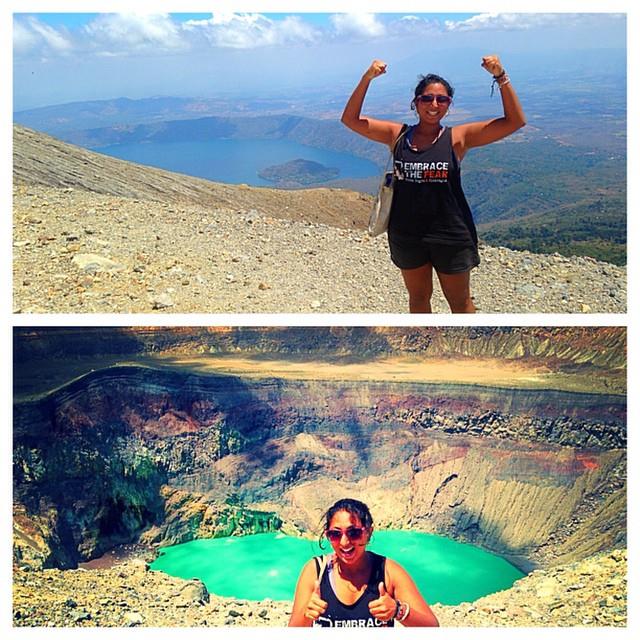
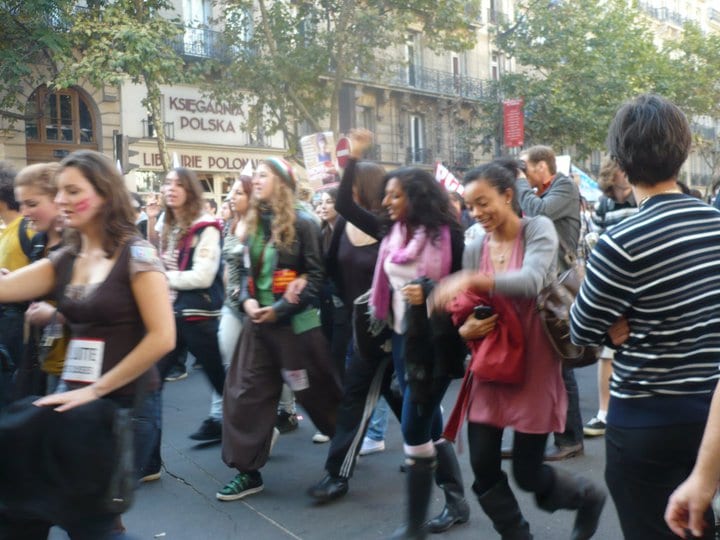
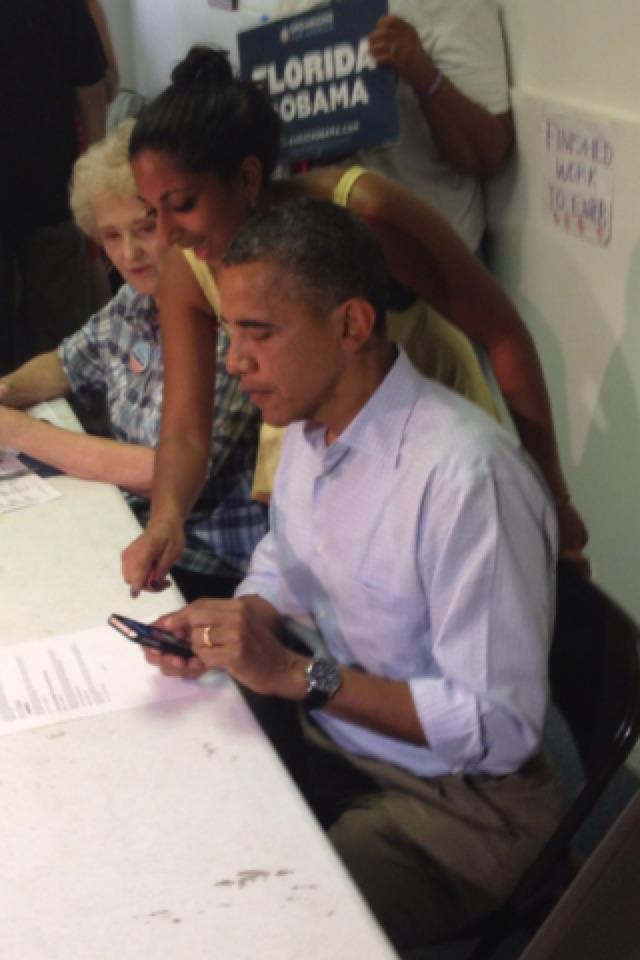
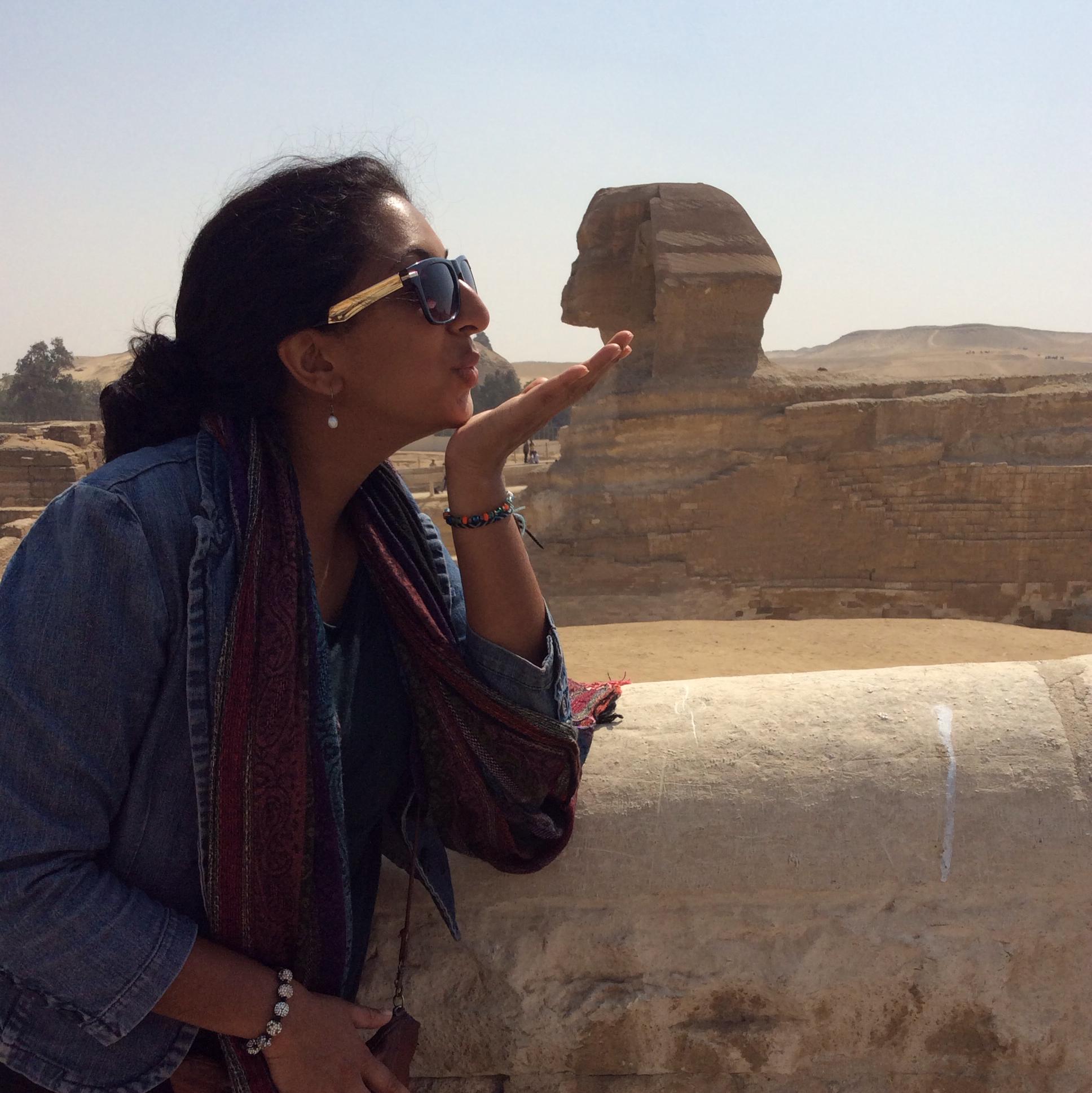
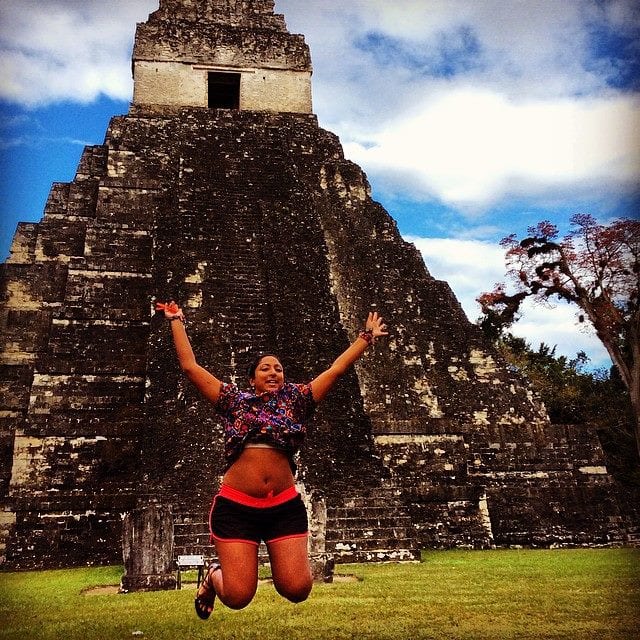
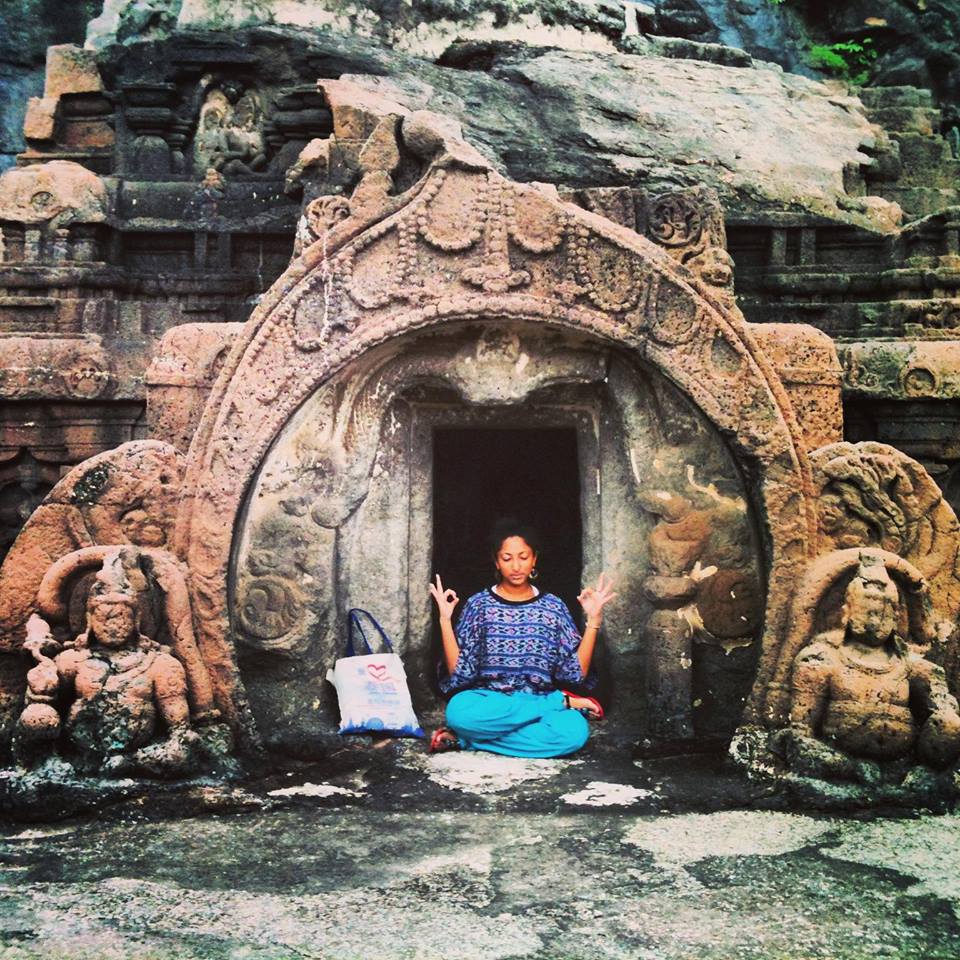
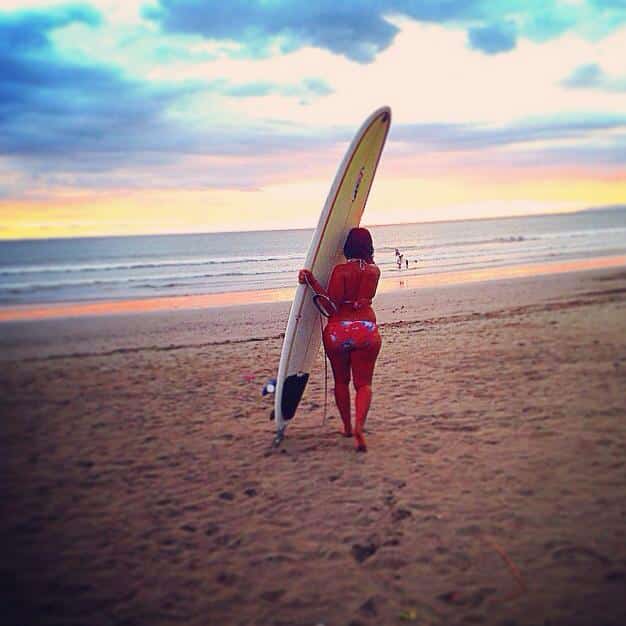
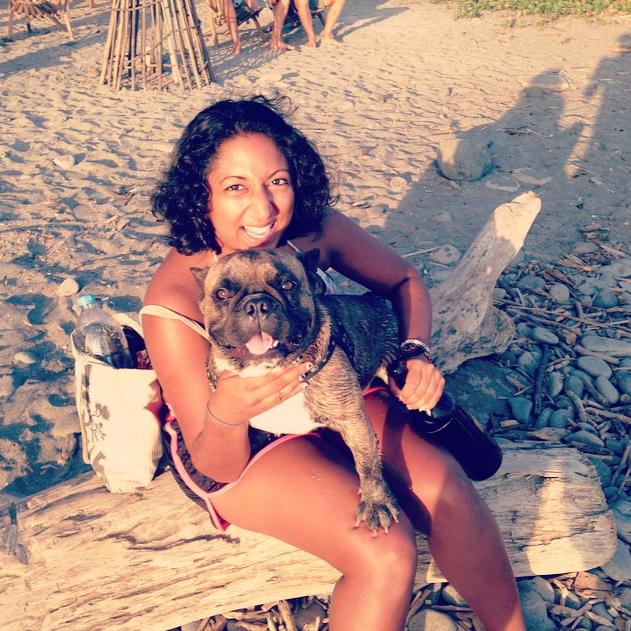
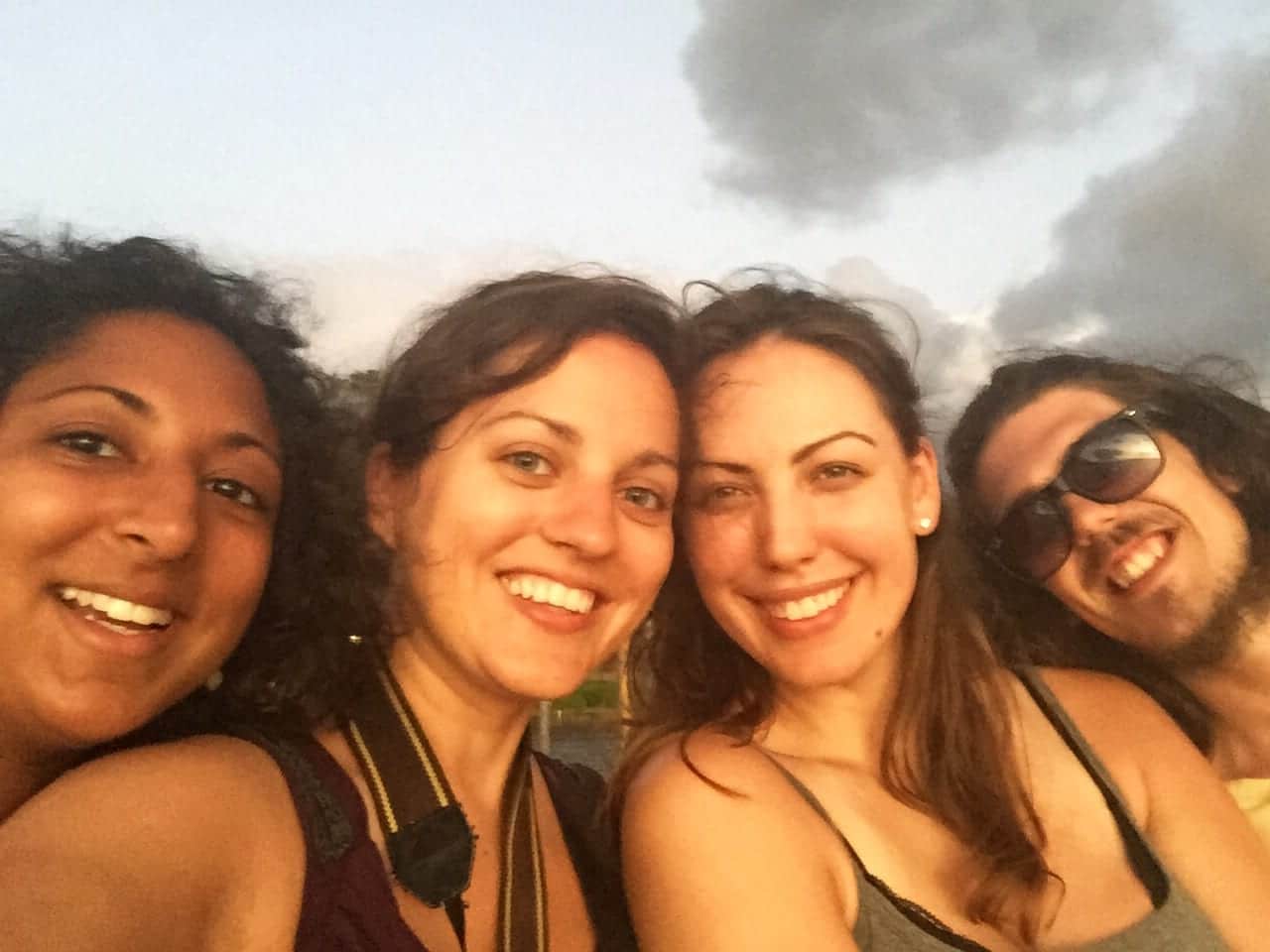
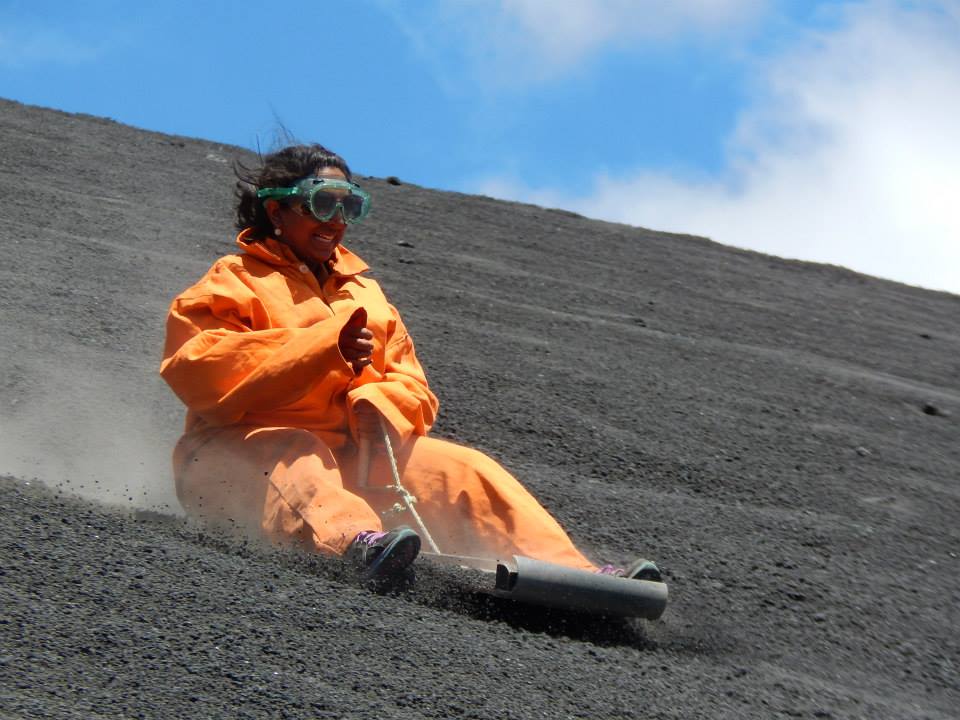
Thank you Maya for such a great interview! I really enjoyed reading it, and you make a lot of excellent points. You’re right, there is a fine line between cultural appropriation and embracing elements of a culture in a respectful way. When I travel I like to try to incorporate some of the local culture but I need to be careful to consider if I am doing it appropriately and respectfully. Thanks for sharing your experiences!
Wow, great stuff here. Great series, Kate! The picture with President Obama is way cool, and the one of you jumping with such joy and zest in Tikal that your shirt flew up brings a huge smile to my face.
I have to admit that cultural appropriation is an issue I struggle with. As a privileged, boring white girl who looks like everyone else (am I allowed to say that? Because it’s often what I think), I think the tendency to “borrow” fashion, food, and even spirituality from other cultures stems from a place of genuine curiosity and (maybe misplaced) reverence. Also, I don’t jive with most of the stereotypical “American” cultural aspects. (Which is made even more obvious because I live in the South.)
For example, I’ve been getting more into practicing meditation and yoga lately — not because I think it makes me look cool, but because I love the way it makes me feel, both physically and mentally — but I don’t have the opportunity to practice in an authentic eastern studio. Does that mean I shouldn’t practice at all? I’m thinking not. But I think you’re saying that I should be cognizant and actively seek to understand the cultures from which these practices came, even if I can’t be 100% authentic in my studies. If we admire something about a culture, we should take the time to learn about it rather than just imitating what we think we know, yes? Thank you for opening my eyes to that.
Cultural appropriation is a very tricky area, and I plan on writing about it more!
This is a great post and I’m excited to read more from this series! As one privileged white girl to another, I think we need more voices from different backgrounds in the travel blogging industry. Like your WITS keynote speech, there is a lot of gender inequality and racial, socioeconomic inequality as well. I’m happy to see you’re putting your words into action and helping others get their stories out there! And Maya is a great first interview. Maya is clearly a very intelligent, passionate, and active female. Thanks for sharing Kate and Maya!:-)
Thanks, Katelyn! Expect much more in the coming months!
Wow, Kate, I LOVE the entire concept behind this post. I had honestly never considered how “white” travel can really be…even budget/backpacker style travel, and even in places & situations where travelers are supposed to be so accepting/down to earth/culturally-aware/whatever. This quote in particular was super thought-provoking: “It’s a very different experience when you look more like, or even identify more with, the locals than your fellow travelers.” Thanks for sharing Maya & Kate, I’m looking forward to reading more posts like this as it’s really something different from what’s on many travel blogs currently. (Also, super jealous of the picture of Maya & President Obama!)
I’m jealous of that photo, too! 😉
Thank you so much Kate and Maya! I feel like this is something which is long overdue. Maya has articulated so much of what I, as another woman of colour, see and feel when I travel. I’ve been dying for someone to write eloquently on this subject and yet I think I’ve only ever read one piece in one travel blog (let alone any other travel literature) which covers this. I think it’s something you could easily not notice if it doesn’t affect you, but almost everytime I go away I can’t help but notice that I am often the only one who is not/does not identify as white. This just perpetuates, not even the myth but just the general sense that people like me don’t travel, and we most certainly don’t backpack on our own. I’m tired of it! Travel is an amazing, transformative experience, why can it only be “open” to you if you fit into a perfect little box of what a traveler “should” be. Anything which encourages more diversity, not just in terms of race but in a host of areas, should be encouraged. Travel, to me, is about defying stereotypes and defying assumptions; the world can only be a better and more tolerant place through greater diversity.
This post reminds me a little of the post Kate did a while ago about how solo female travel is different from male travel, because as women we tend to just be more on edge about our safety anyway; traveling as an Anglo-Indian is different from what it is for someone who is not a person of colour and it’s something which is so hard to understand if you don’t live it everyday. I’m not saying it’s better or worse but it is different. I’m lucky enough, like the writer, that I can pass for multiple ethnicities; I’ve been mistaken for a local in as different locations as Mexico, Tunisia and Indonesia! I personally see this as a benefit a lot of the time as you can literally blend in a lot more easily, which can make quite an interesting comparison when people realise you aren’t local and treat you in a different way. At the same time there are countries where I have had things shouted at me just because of the colour of my skin and that is a wound which cuts deep; fortunately these instances are few. But alas it is something I have to consider, it adds to all those other microdecisions we make everyday. That being said I would not change it for the world. I am fiercely proud of my heritage and cherish what makes me different.
Thanks for reading (if anyone has!) and apologies for the long comment, but this is a subject which I am passionate about in case you hadn’t guessed.
Laura! I am a traveller of colour who writes about race and travel– there are many of us but sadly we often don’t have the reach/numbers that some of our white/mainstream travel writers do… Which means that you probably don’t know about us or have never heard of us. But we are out here, travelling, and writing about it! At any rate, I echo many of your sentiments, especially about the exclusion of POC travellers in travel media! I wrote a blog post about it here, check it out: http://www.oneika-the-traveller.com/lack-black-travel-blogging-travel-media.html
Sorry Kate for the highjack but I am also very passionate about this topic and find it a shame that travellers like Laura don’t think they have bloggers with whom they can identify… when in fact we are here writing about our experiences.
Please, hijack all you want! 😀 I love your point of view!
Thanks for sharing, Laura!
A fascinating and enlightening interview, and I love this new feature – keep ’em coming!
I absolutely love this post. Goes to show that any woman – any race, profession, passport, citizenship, nationality, and so on can travel! I’ve had my fair share of challenges given that I have a third world passport, but that hasn’t stopped me from living a life of travel. Thanks for this, Kate! Always, always love your posts 🙂
Thank you for this post! As a lady traveler of color myself, I just really needed this. It was very odd to find myself traveling and contending with not just one but TWO different worlds: that of the locals and that of the white backpacking community. For me, it was particularly interesting how much my white fellow travelers stood out and commanded attention: locals would bug them for pictures and it seemed easier to get help when I was standing next to them. I was invisible in comparison, which wasn’t always a bad thing! I ducked a foreigner fee once because everyone thought I was a local. It’s a way of travel I wouldn’t trade for the world.
Thank you, Maya, for sharing your perspective! Your point about cultural appropriation and how hurtful it was to you, and how also to make sure that you’re not appropriating other cultures, was really insightful and helpful for me. It’s a topic that I find I often have trouble with – it can be tough to figure out how one can appreciate another culture respectfully vs appropriating it.
And thank you, Kate, for creating a platform for this discussion!!
We will be talking more about cultural appropriation in a future post!
Maya, you are a badass. Thank you for handling this topic in a straightforward way without a hint of bitterness. People need to hear that.
Also, putting credit cards in your birth control case is brilliant! Thank you for sharing that tip. I hope you will encounter more respectful people in the future, enjoy your travels!
I love that safety tip!
Awesome Interview! As a woman of color about to embark on my own travel adventure, I appreciate Maya’s perspective. Thank you for your candor and I will certainly add a birth control case to my shopping list!
As a male. I thought the interview was thought provoking and more insight then I could have imagined while travelling. Thank You.
This was a really insightful post, I’m looking foreward to reading more!
This is a breath of fresh air! Thank you Maya! She has some real perspective on travel as well as a critical view point of a lot of the contradictions people face everyday who travel or are exposed to travelers/backpackers. Kate, I am really looking forward to more Viewpoint posts!
Cheers,
Glad to hear it, Emily! I’m glad I had someone so great for the first post!
I love the new concept you’re introducing. It will fit well with your blog, I think. And well done on finding such an inspiring person for the first post! Loved reading about it and the photo with Obama was pretty cool!
Loved the post! I so agree to your thoughts, Maya. It’s hard to be a solo woman traveler in the first place. An then, it’s a whole together different story if you speak the local language or look like the local population. They might never turn out to be a negative thing but still that is very much there.
You KNOW how much I love this feature, Kate (Maya, you rock!)! As a black traveller and travel blogger I have sometimes struggled with the lack of representation of people of colour in the travel sphere. There is a need for features like these: simply put, we have unique voices and experiences due to our cultural/racial backgrounds and these shape our experiences on the road. Recreational travel, gap years, and the travel media that encompass and promote them are spaces that are severely “white”, filled with travellers who look just like you and very few that look like me. It’s a shame because travellers like me are given little impetus or encouragement to go abroad, most simply think it is something that people like “them” don’t “do”.
Thankfully, my little corner of the internet is a place that allows me to share my travels to 70+ countries: all the pratfalls, the complimentary (though sometimes misguided) comments about my dark skin and afro-textured hair, my being mistaken for a local (because a black chick could never REALLY be Canadian! *wink*!). I get at least 3 emails a week from travellers of colour just like me thanking me for giving voice to a journey that they themselves are on. That said, I have nowhere near the reach and fanbase you do so thank you for using your big corner of the internet to highlight different viewpoints and perspectives!
At any rate, let me leave this right here: one of my posts about travelling while black–contains links to some of my other posts about race and travel and might resonate with some of your readers.
http://www.oneika-the-traveller.com/musings-on-race-and-travel.html
Oneika, thank you so much for your support! I really think we need to cover this more in depth — and not just travelers of color, but also travelers who are frequently only seen as niche travelers when they should be seen as, well, just travelers!
Very interesting read. As a white girl I guess I haven’t really thought about how much easier it is for us to travel, especially as I am also a Kiwi and travel is instilled in most of us at a young age. I was surprised to read that Maya thinks that white people are misappropriating the Indian culture by drinking chai lattes and doing yoga because it is ‘cool’. Maybe that is why some people do things but I think that the majority that drink ‘chai lattes’ do it because they taste good and do yoga because it gives them a sense of wellbeing. I would think it was a complement to the culture not disrespectful. The hippies dressing up with bindis and singing nonsense Hindu songs is a different story though – that must have been frustrating to see
Honestly, cultural appropriation vs. cultural exchange can be a tough line to walk. I’ll be writing about it more in the future.
Great going Kate and brilliant post Maya! Very impressed by everything that you’ve done and will continue to do.
It’s a touchy subject and I’m proud of everyone that has put their perspective on this. I’m a woman of colour and a little older (ahem!), and my take has been different mainly because I’m British and come from an upper-midde class background, my father was an engineer, I went to an independent (private) college and I have a posh accent. I’m also from the Northern part of England. I’m thinking based on that alone, has already singled me out as “other” and I’m quite OK with that. Secondly, I don’t see my own colour and I haven’t let it affect whatever I want to do and wherever I want to go. Why should it?
There will always be people who have a issue but that’s their problem and not mine. I’ve found that in most cases, it’s due to ignorance rather than insolence and I’ve given many a person a little lesson on politeness & etiquette to put them straight. 🙂
Good for you for politely showing people the right way, Victoria!
I love – LOVE – this new series already! Having worked in international development in college and worked/traveled mostly in developing countries since, the extreme “whiteness” of the backpacking community has often crossed my mind — but being, like you, a white, straight, able-bodied, educated, middle-class American, I’ve never really known what to do with all of those misgivings. I love that this series represents a platform bringing voice to travellers outside the backpacker norm.
Maya, you seem seriously badass! Love your photos. Thanks especially for sharing your story about cultural appropriation in Guatemala. I’ve found that similar actions I’ve witnessed often come from a place of genuine ignorance and that talking about why it’s not okay is usually the best way to address it — and I’m sure that sharing your story will inspire readers to think differently. Also love the birth control tip — and I’m happy to hear that you were okay in the robbing incident!
Glad to hear it, Katie!
I enjoyed reading this very much! And all the experiences i could relate to. As a half turkish/half german woman i might not classify as a woman of colour but the experiences all sound too familiar. in all the spaces i lived, i was always “different looking” and had a lot of explaining to do.
and what was the hardest so far, was travelling to sri lanka and being exposed to a people who somehow considered me being part of them and expecting me behaving a certain way. which totally threw me off, since i really don’t look sri lankan at all (in my mind, i mean i was asked severeal times if i was half sri lankan) but after a week or so i noticed all the billboards showing commercials for “fairer skin treatments” and somehow i looked pretty much like those models. so i got thrown in this whole concept of being a very pretty woman for the people over there while they were assuming i was one of them and trying my hardest not to offend their culture which i knew so little about.
and it also exposed me to a lot of sexual harrassment, which left me not really enjoying my time there….
it a tricky thing this whole travelling buissness as a woman (and colour)
thank you very much for this article!
THIS WAS AWESOME!
Great post! Incredibly insightful, and as a Korean-American I found myself nodding my head to many of the things said about cultural appropriation and being treated differently than my white peers.
I absolutely love the idea of these posts. Being a white person I’ve been realising more and more what white person ignorance is- that because I live with privilege I don’t really notice when the only backpackers around me are white.
This post reminded me of a friend I went to Vietnam with who has Malaysian heritage and they couldn’t comprehend the fact that she was Australian. She has been in China for the last year and is having the same problem there even though she looks more Malay than anything.
I once hung out with a Chinese-American traveler in Macedonia and a local went through the whole, “Konichiwa! Arigato! Tokyo!” thing as we both smiled weakly.
This remains as one of the best interviews I have ever read. 🙂
Very insightful .
Thanks to both of you. 🙂
http://www.anothertravellab.blogspot.in
Very glad you enjoyed it, Saakshi!
Please don’t stereotype the “white people” out there, I’m one of them, and it’s not my identity as a human being. I’m an American white woman, always travel solo, & have stayed in hostels all over Europe. Maya, if we met at a hostel we would probably end up hanging out cause I can see you like to let loose and have fun like me, which is what it’s all about. I get what you’re saying, and the small minds & tiny worlds that people live in are unfortunate, they don’t know what they’re missing by forming such a concrete opinion of someone they don’t know, I feel sorry for them cause they miss out on alot. But every person’s experience, anywhere, is their own – if you assume people will treat you different, then they will. If you assume they will act a certain way towards you because they are white & you are not, then they will. It’s the law of attraction – the more you think of something happening a certain way, positive or negative, then it just simply will. When I’m in a bad mood at work, the grumpy customers will find me & give me a dose of their misery. When I’m in a good mood, the happy ones come up to me smiling & laughing. It’s good you got this off your chest, you needed to, but it’s time to assume things will go well anywhere you go…this is the solution. Focusing on the problem will only keep repeating the problem. This has been my life experience so far…. Good luck to you!
Hi Kate
How would you like an interview with a white guy born of British parents in South Africa during the apartheid years and how it affected his travels abroad in the UK and Europe. No mater whether you were black or white you couldn’t get visas for many countries and there was a lot of discrimination too.
There’s a lot more to this story.
That sounds fascinating, Grahame. At this point, I’m focusing on women’s stories, but I’ll keep you in mind!
Reading all of these responses are almost as good as the insightful excellent original post by Maya. I am an older, ok, 68, traveler who had sporadically been able to travel solo throughout my life, when I had some money, but as a very young on my own single mom and a nurse – had other responsibilities I told myself. Now wow I am able and willing, fit and somewhat experienced in life. As an older solo traveler using air bnb and some hostels what is interesting about my age is how nearly invisible I am. What I can see, who I can talk to without sexual subtext. White and priviledged, yes. I was always aware of this and sometimes painfully so but agism really is a thing too. Old white lady traveling alone can be a target like at the Milan train station ticket machines – “pregnant” gypsies coming out of the woodwork! Getting a 4am train out of Florence buttonholed by a shakey skinney kid obviously in withdrawal (I gave him chocolate) poor kid. ” Why you travel alone”, an Italian TI person said. You make too much work! Get in a group! I blow most of this off. In Costa Rica I rented a 4×4 and drove from Samara to the Osa peninsula to Finca Exotica. Talked in a park during a parade in San Juan with local prostitutes who saw me as no threat, long conversations with folks who saw me as a motherly figure or whatever and related to me on that level. Sometimes it is hard to break through the age thing and talk people to people, person to person but it can be done. Not yet robbed, but one never knows. I am careful or so I think and never keep all money in one place. So wonderful to always be learning about people and cultures. I still teach nursing a two semesters a year in a very diverse Cleveland center city community college and my immigrant students give me lots of tips – tips that led me to Slovenia and the wonderful parks,the islands on the coast of Croatia, Puglia and more. You ladies are far ahead of me. I have Asia ahead of me. And my African students have given me tips about that continent. I can’t wait. Barbara
This really is an interesting incite and thankyou for pointing out that backpacking is a very privileged space. Although I understand the viewpoint of travel bloggers going on about how anyone can travel NOW, it winds me up a bit as it really isn’t possible for the vast majority of the world’s population. We are very lucky to come from countries who’s passports allow us to travel and who’s economies allow us to save spare money for adventures. It takes a special type of person to travel when you are really poor. Thank-you!
You done the nice job .:)
Really enjoyed reading this post. As someone born and raised in South Africa, we’re called the “Rainbow Nation” with good cause. There are frequent debates over skin colour and rights to the land we’ve all settled in, but for the most part, everyone is happy to co-exist in a beautiful place, but there are indeed issues for those of mixed race certainly depending on where you go, and this post helps in great ways to illustrate those hardships and how to work around them.
Hi Maya, randomly I think I met you a couple of years ago in Pai, Thailand and remember having the cultural appropriation conversation with you then. Loved your contribution and as a woman of Jamaican heritage can completely relate, many backpacker “hippie” towns love to appropriate elements of Rastafarian culture with no understanding of what it’s about! Really grinds my gears and makes me uncomfortable.
Naomi, this is SO funny, I just saw this response when I was digging up this article for a pitch and YES, i completely remember you! We absolutely had this conversation in Pai too. So cool to reconnect and hear you resonated with the article – hope you are doing well and that we run into each other again down the line! 🙂
Love that you are doing this as a series Kate and what a great first intereview! Maya seems like a real world traveler and she really jumps high too!
She’s an inspiration, that’s for sure!
Hi Kate. I came across your blog while on the Solitary Wanderer travel blog. I am a woman of color who just recently caught the travel bug. I was interested in what your article had to say. I want to say thank you for your honesty in addressing this topic. I learned a lot from Maya and from your readers who responded in the forum.
I’m glad to hear that, Caroline. Welcome!
I admire Maya for taking the time to ask the Guatemalan shopkeeper about the meaning behind the fabric of her purchase. As I’ve become more interested in cultural significance behind clothing and accessories, I find myself asking about where the product was made, who made it, and what meaning or story it has behind it. From this, I not only value what I’ve purchased, but I show respect for the culture behind it. Cultural appropriation can be a tough line to decipher, but taking the time to experience and respect a culture goes a long way!
It’s interesting what Maya mentioned about yoga, because I recently read an article about a former yoga instructor who no longer teaches because people were restricted from teaching traditional yoga or any form of yoga not adapted in the U.S. The former teacher didn’t see the value of only teaching one culture/country’s form of yoga. I completely agreed with the article and feel that not respecting a traditional practice limits your experience and mindset.
That’s interesting about the yoga, Brooke. I’d like to read more about that.
Loved this interview. Thought it was refreshing to see the fact that backpacking is often something that is considered privileged. I’d love to hear more from women from conservative families and how those families reacted when the woman wanted to study abroad or travel alone. I look forward to how you explore cultural appropriation as well. Go deep, friend! Go deep.
Whatever Maya is doing seems quite interesting though scary. Thanks Kate and everyone.
Hats off to the two brave- hearted adventurous and my personal- favorite women travelers!
This interview is a wonderful idea Kate to expose those “Jane- bonds” fleeting their wings and soaring new skies.
Maya, is there any place at all where you haven’t set foot upon except Mars and Moon. Everything you do as I see, is directly or indirectly interconnected with the rest of the world.
You are such an inspiration.
Wow! great series, i am appreciating your blog so much. haha